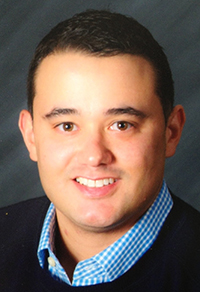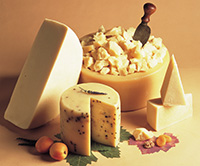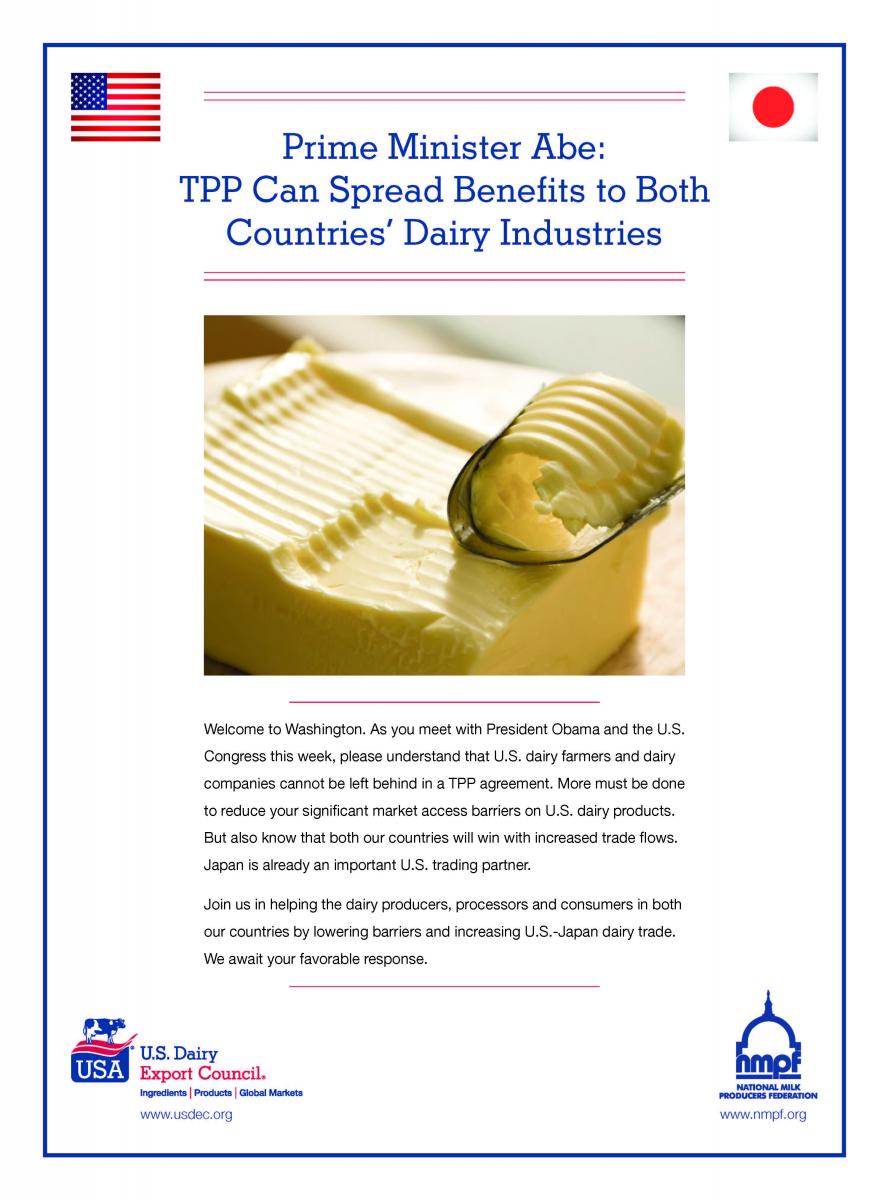Uncategorized
University of Illinois’s John Newton to Join NMPF Economics Department
 ARLINGTON, VA – Agricultural economist Dr. John Newton will join the staff of the National Milk Producers Federation on July 1 as Senior Director of Economic Research, enhancing the research and analytical capabilities of the organization. Newton currently is a Clinical Assistant Professor in Agricultural Commodity Markets, Department of Agricultural and Consumer Economics, at the University of Illinois at Urbana-Champaign.
ARLINGTON, VA – Agricultural economist Dr. John Newton will join the staff of the National Milk Producers Federation on July 1 as Senior Director of Economic Research, enhancing the research and analytical capabilities of the organization. Newton currently is a Clinical Assistant Professor in Agricultural Commodity Markets, Department of Agricultural and Consumer Economics, at the University of Illinois at Urbana-Champaign.
Newton has more than a decade of experience in dairy policy, and has played a major role in the past year in helping the U.S. Agriculture Department implement the new federal dairy Margin Protection Program through his work with the Dairy Markets and Policy collaboration among Midwestern economists.
“John understands both the art and the science of helping farmers manage the risks of price volatility. His skills at data analysis will help our members understand where milk and feed prices are going, and more importantly, how they can use tools like the MPP to their advantage,” said Jim Mulhern, President and CEO of NMPF.
“His experience with the Federal Milk Marketing Order system, where he worked in a regional market administrator’s office, gives John an in-depth understanding of the importance of this program to farmers and cooperatives for the orderly marketing of milk,” Mulhern added.
Newton said that “I am looking forward to drawing on my experience in government and academia to help America’s dairy farmers confront the economic challenges they are facing, and working with them on ways to prosper in the future.” A native of Louisville, Kentucky, Newton received a Ph.D. in agricultural economics, a M.A. in macroeconomics, and a M.S. in agricultural economics, all from The Ohio State University. He has been at the University of Illinois since 2014.
Newton will be working with NMPF’s current economics staff, including Peter Vitaliano, Vice President of Economic Policy and Market Research, and Dustin Baker, Economic Analyst.
From 2004 to 2014, Newton worked for the USDA’s Agricultural Marketing Service on issues relating to risk management and federal farm income support programs. While serving in this role, Newton had the prestigious opportunity to serve both as a 2013 fellow on the United States Senate Committee on Agriculture, Nutrition, and Forestry and as a researcher for the USDA Office of the Chief Economist, providing policy insight for the Agricultural Act of 2014.
The National Milk Producers Federation, based in Arlington, VA, develops and carries out policies that advance the well-being of dairy producers and the cooperatives they own. The members of NMPF’s cooperatives produce the majority of the U.S. milk supply, making NMPF the voice of more than 32,000 dairy producers on Capitol Hill and with government agencies.
Too Much of a Good Thing
When she said that “too much of a good thing can be wonderful,” Mae West might have been referring to food and wine…or perhaps other earthly pleasures. But she certainly didn’t have in mind what some Europeans are attempting to do with the names of some foods, including many cheeses: corrupting the legitimate concept of tying a food product to its place of origin, by distorting that notion in a way that hurts both consumers and food producers.
NMPF, the U.S. Dairy Export Council and the Consortium for Common Food Names have been sounding the alarm bells for several years about how the European Union – and it’s mainly just a subset of food companies and countries within Europe – want to restrict trade by monopolizing common foods names for their exclusive use.
I spent a week in May traveling to Brussels, Berlin and Dublin to deliver the message to a variety of EU policymakers and dairy stakeholders that these efforts to bastardize the concept of geographic indicators are indeed a very bad thing. If pursued by the EU’s trade negotiators, this effort will doom the prospects for a U.S.-EU Transatlantic Trade and Investment Partnership. This blatantly anti-competitive approach is something that America’s policymakers just won’t swallow.
Another important message to make clear was that, from the U.S. perspective, some use of geographic indicators can be beneficial…in moderation. We have no issue with specific names for foods from specific regions, the best examples being Parmigiano Reggiano in Italy, or Holsteiner Tilsit in Germany. These compound names refer to a specific cheese type, from a specific region. And consumers know well the difference when they are buying a Parmigiano Reggiano versus an American parmesan cheese.
But the legitimate use of compound names is very different than restricting the use of common, generic names, including parmesan, feta, asiago and havarti – just four examples where the EU has been fighting hard to monopolize these names for some member states (even though feta and havarti do not refer to any city or region in the world, let alone a region of Europe).
When food names have long been in the public domain, as has “parmesan,” it is completely inappropriate for government trade regulations in the 21st century to summarily remove the ability of cheesemakers outside of Italy to use such a name. Already, the U.S. is not permitted to sell in Europe parmesan, muenster, feta or several other common cheese types, due to the EU’s decision to permit only certain member states to use these product names. Additionally, the EU has negotiated trade deals with other countries that restrict the marketing of cheeses with these names, even if these are American-made cheeses that were not part of the bilateral agreement made between the EU and another nation.
The Europeans have suggested generating a list of names that we in the U.S. would agree to allow them to keep for themselves (and it includes meats and wines, not just cheeses). But this is a non-starter. It is an attempt to legitimize a completely illegitimate name-grabbing scheme. We already have a system that works: the compounding of a specific locale with a generic name, in order to provide a clear place of origin definition, is appropriate. But to say parmesan, asiago, muenster, feta or gorgonzola are the sole purview of a particular country or area is simply wrong, in any language.
Major trade deals like the TTIP involve lengthy negotiations, because they will have decades-long implications for commerce between our nations. As always, the Europeans are playing the long game here, realizing that in the globalized future, dairy is a growing market with big opportunities. Clawing back geographic indications for their foods is Europe’s attempt to forestall competition with the U.S., and other New World countries, in the global market.
But we are in this for the long haul, too. Therefore, if an agreement is to be reached on GIs, it needs to include a suitable model for protecting both legitimate geographical indications, while protecting the broader use of generic food names. If there is to be an eventual U.S.-EU free trade agreement, it must be one in which European consumers have the opportunity to buy a Wisconsin Asiago, just as American consumers have long been able to buy a Parmigiano Reggiano.
There is the possibility of a reasonable outcome here, but not if the pursuit of too much of a good thing becomes the enemy of a fair and balanced approach.
Dairy Groups Praise Senate Passage of TPA, Call for Quick House Action
 ARLINGTON, VA – The National Milk Producers Federation and U.S. Dairy Export Council tonight commended the Senate for approving new Trade Promotion Authority (TPA) legislation. They urged members of the House of Representatives to quickly pass their own TPA legislation.
ARLINGTON, VA – The National Milk Producers Federation and U.S. Dairy Export Council tonight commended the Senate for approving new Trade Promotion Authority (TPA) legislation. They urged members of the House of Representatives to quickly pass their own TPA legislation.
“Trade promotion authority is crucial to concluding trade agreements that will open foreign markets to more U.S. dairy products,” said NMPF President and CEO Jim Mulhern. “In the Trans-Pacific Partnership negotiations in particular, having TPA in place is essential to increase pressure on Japan and Canada to extend their best offers.”
USDEC President Tom Suber added, “Knowing that a trade agreement will be considered by Congress under Trade Promotion Authority paves the way to press our negotiating partners to make their best offers on the most sensitive issues. Clearly, dairy exports fall into that category, and the U.S. needs all the tools it can muster to get the best possible deal.”
The two organizations said TPA will increase congressional influence over trade negotiations and lead to agreements that are better for both the country and the dairy industry. They urged the House to take up TPA legislation soon after returning from the Memorial Day recess.
TPA, which expired in 2007, is important to the U.S. dairy industry because the United States now exports the equivalent of one-seventh of its milk production.
###
The National Milk Producers Federation, based in Arlington, Va., develops and carries out policies that advance the well-being of U.S. dairy producers and the cooperatives they collectively own. The members of NMPF’s cooperatives produce the majority of the U.S, milk supply, making NMPF the voice of nearly 32,000 dairy producers on Capitol Hill and with government agencies. For more on NMPF’s activities, visit www.nmpf.org.
The U.S. Dairy Export Council is a non-profit, independent membership organization that represents the global trade interests of U.S. dairy producers, proprietary processors and cooperatives, ingredient suppliers and export traders. Its mission is to enhance U.S. global competitiveness and assist the U.S. industry to increase its global dairy ingredient sales and exports of U.S. dairy products. USDEC accomplishes this through programs in market development that build global demand for U.S. dairy products, resolve market access barriers and advance industry trade policy goals. USDEC is supported by staff across the United States and overseas in Mexico, South America, Asia, Middle East and Europe. The U.S. Dairy Export Council prohibits discrimination on the basis of age, disability, national origin, race, color, religion, creed, gender, sexual orientation, political beliefs, marital status, military status, and arrest or conviction record. www.usdec.org
Dairy Groups Praise Diplomatic Struggle against Additional Restrictions on Common Food Names
 The dairy industry today praised U.S. representatives to a key international meeting for leading the fight against treaty changes that could seriously impair the ability of companies worldwide to use generic food terms in export markets. Among those potentially affected are U.S. dairy producers and processors relying on numerous generic cheese names.
The dairy industry today praised U.S. representatives to a key international meeting for leading the fight against treaty changes that could seriously impair the ability of companies worldwide to use generic food terms in export markets. Among those potentially affected are U.S. dairy producers and processors relying on numerous generic cheese names.
The National Milk Producers Federation, the U.S. Dairy Export Council and the International Dairy Foods Association jointly thanked the U.S. delegation to the World Intellectual Property Organization’s Diplomatic Conference on the Lisbon Agreement for calling attention to the treaty changes. They also praised the U.S. diplomats for leading a coalition of countries in criticizing the lack of an inclusive WIPO process as well as the negative costs the agreement will likely impose on taxpayers, farmers and companies in other countries.
The three organizations urged the U.S. Trade Representative to evaluate the degree to which countries’ actions under the agreement are likely to violate World Trade Organization obligations and called on Congress to examine the deeply troubling side-lining of a majority of WIPO members in the development of an agreement with global ramifications.
WIPO is a United Nations agency charged with developing a balanced international intellectual property system. It concluded two weeks of talks in Geneva today that both expanded the Lisbon Agreement for the Protection of Appellations of Origin to include geographical indications and expanded the protections granted under the international registry of protected terms.
Geographical indications limit who can use certain product terms or names to those in a particular geographic area. GIs have been widely abused in recent years by European interests seeking to restrict competition from the United States and other non-European countries.
During the two-week diplomatic conference in Geneva, the United States led a 12-nation coalition in opposing the Lisbon Agreement changes and in urging equal participation rights for all WIPO members in considering the changes. In a radical departure from multiple precedents, WIPO chose to permit Lisbon Agreement members to deny meaningful participation to the majority of WIPO members.
Despite this power grab, the U.S. and its allies used the conference to draw attention to the agreement’s failure to adequately safeguard both trade and intellectual property rights. Dairy groups urged continued international collaboration in opposing misuse of geographical indications.
“The treaty and its proposed changes are clearly aimed at preventing competitors such as dairy producers and processors in the United States and other non-European countries from using names in international trade that they have used for decades,” said NMPF President and CEO Jim Mulhern. “We appreciate and commend the extensive work the office of the U.S. Trade Representative and the U.S. Patent and Trademark Office, along with the departments of State and Agriculture, have put into opposing these changes and in decrying WIPO’s refusal to allow all members to have a full say in the outcome of this agreement.”
USDEC President Tom Suber added, “WIPO’s decision to force non-Lisbon members into second-class status at this conference strips the resulting outcome of its legitimacy as an international agreement. It’s clear that this agreement is an effort to promote the interests of GI holders at the expense of generic users, rather than trying to balance both those concerns in good faith. It is clear to us that there are serious WTO consistency problems with the approach Lisbon members have decided to pursue and we ask USTR to carefully examine how to address these trade commitment violations.”
IDFA President and CEO Connie Tipton agreed, noting that “with U.S. leadership, international collaboration on these crucial issues can continue in a variety of forums. Countries have a right to enter into treaties to address their own goals, but this should not come at the expense of other countries’ exports, nor their rights to fully participate in treaties having international impacts.”
The National Milk Producers Federation (NMPF), based in Arlington, Va., develops and carries out policies that advance the well-being of U.S. dairy producers and the cooperatives they collectively own. The members of NMPF’s cooperatives produce the majority of the U.S, milk supply, making NMPF the voice of nearly 32,000 dairy producers on Capitol Hill and with government agencies.
The U.S. Dairy Export Council (USDEC) is a non-profit, independent membership organization that represents the global trade interests of U.S. dairy producers, proprietary processors and cooperatives, ingredient suppliers and export traders. Its mission is to enhance U.S. global competitiveness and assist the U.S. industry to increase its global dairy ingredient sales and exports of U.S. dairy products. USDEC accomplishes this through programs in market development that build global demand for U.S. dairy products, resolve market access barriers and advance industry trade policy goals. USDEC is supported by staff across the United States and overseas in Mexico, South America, Asia, Middle East and Europe. The U.S. Dairy Export Council prohibits discrimination on the basis of age, disability, national origin, race, color, religion, creed, gender, sexual orientation, political beliefs, marital status, military status, and arrest or conviction record. www.usdec.org
The International Dairy Foods Association (IDFA), Washington, D.C, represents the nation’s dairy manufacturing and marketing industries and their suppliers, with a membership of 550 companies within a $125-billion a year industry. IDFA is composed of three constituent organizations: the Milk Industry Foundation (MIF), the National Cheese Institute (NCI) and the International Ice Cream Association (IICA). IDFA’s nearly 200 dairy processing members run nearly 600 plant operations, and range from large multi-national organizations to single-plant companies. Together they represent more than 85 percent of the milk, cultured products, cheese, ice cream and frozen desserts produced and marketed in the United States. IDFA can be found at www.idfa.org.
U.S. Dairy Industry Supports Action by Congress to Repeal Country of Origin Labeling
 ARLINGTON, VA – American dairy products headed to Canada and Mexico could face stiffer tariffs – and ultimately, reach fewer foreign customers – unless Congress repeals Country of Origin Labeling (COOL) requirements for meat products that violate international trade rules, the National Milk Producers Federation and the U.S. Dairy Export Council said today.
ARLINGTON, VA – American dairy products headed to Canada and Mexico could face stiffer tariffs – and ultimately, reach fewer foreign customers – unless Congress repeals Country of Origin Labeling (COOL) requirements for meat products that violate international trade rules, the National Milk Producers Federation and the U.S. Dairy Export Council said today.
Under the World Trade Organization ruling announced Monday, “Canada and Mexico are entitled to retaliate against U.S. exports, and that could well include higher tariffs on U.S. dairy products,” said Jim Mulhern, NMPF president and CEO. He noted that Canada has already indicated it will target the U.S. dairy industry, while Mexico retaliated against U.S. dairy products in a past NAFTA finding against the United States.
America’s dairy farmers should not suffer collateral damage as a consequence of our COOL policy. The U.S. government needs to rectify this situation before we lose any export customers,” Mulhern said.
“Mexico is our largest export market, and Canada is also a significant destination for U.S. dairy products,” said Tom Suber, president of USDEC. “At a time of softer global dairy demand, we need to be focused on ensuring we keep exports moving and doing all we can to avoid new roadblocks from being put in our exporters’ paths.”
The WTO will finalize by the end of the month the recent decision faulting U.S. COOL requirements, after which Canada and Mexico can formally request permission to retaliate against the United States. Retaliation will be determined by how much the two countries can raise tariffs to address their losses under the U.S. meat labeling requirement, which was first challenged by Canada and Mexico in 2009. A panel will have 60 days to review the tariff amount, although the United States, Canada and Mexico could discuss a settlement before the 60-day clock runs out. The United States could see retaliatory tariffs by late summer or fall.
NMPF and USDEC are among a long list of food and agriculture organizations supporting bipartisan legislation to head off retaliation by repealing country of origin labeling requirements enacted in 2002. H.R. 2393, introduced by House Agriculture Committee Chairman Michael Conaway (R-Texas), is scheduled for committee consideration today.
Mulhern said NMPF will also be educating both House and Senate members to make sure they understand that dairy will likely be hurt if steps are not taken to bring the United States into compliance with the WTO rules.
“With U.S. farmers relying more and more on exports for income, we cannot allow the country of origin labeling issue to interfere with increased dairy trade in the hemisphere,” Mulhern said.
###
The National Milk Producers Federation, based in Arlington, Va., develops and carries out policies that advance the well-being of U.S. dairy producers and the cooperatives they collectively own. The members of NMPF’s cooperatives produce the majority of the U.S, milk supply, making NMPF the voice of nearly 32,000 dairy producers on Capitol Hill and with government agencies. For more on NMPF’s activities, visit www.nmpf.org.
The U.S. Dairy Export Council is a non-profit, independent membership organization that represents the global trade interests of U.S. dairy producers, proprietary processors and cooperatives, ingredient suppliers and export traders. Its mission is to enhance U.S. global competitiveness and assist the U.S. industry to increase its global dairy ingredient sales and exports of U.S. dairy products. USDEC accomplishes this through programs in market development that build global demand for U.S. dairy products, resolve market access barriers and advance industry trade policy goals. USDEC is supported by staff across the United States and overseas in Mexico, South America, Asia, Middle East and Europe. The U.S. Dairy Export Council prohibits discrimination on the basis of age, disability, national origin, race, color, religion, creed, gender, sexual orientation, political beliefs, marital status, military status, and arrest or conviction record. www.usdec.org
NMPF and IDFA Commend Introduction of School Milk Nutrition Act
WASHINGTON, DC – A bipartisan bill to help reverse the decline of milk consumption in schools will be introduced this afternoon by Representatives G.T. Thompson (R-PA) and Joe Courtney (D-CT). The School Milk Nutrition Act of 2015 focuses on preserving milk’s role in school feeding programs, while complying with the most recent Dietary Guidelines for Americans (DGA).
The School Milk Nutrition Act of 2015 aims to increase milk consumption in schools by reaffirming the requirement that milk is offered with each school meal, consistent with current law and the DGA. The bill also aims to improve the variety and availability of milk served in schools through a new pilot program and research.
The International Dairy Foods Association (IDFA) and the National Milk Producers Federation (NMPF) strongly support the bill and encourage Congress to adopt it in the Child Nutrition Reauthorization process.
With Congress set to reauthorize school nutrition programs this year, we applaud Congressman Thompson and Congressman Courtney for introducing this bill, and for recognizing the importance of milk to the health and well-being of our nation’s school children,” said Connie Tipton, president and CEO of IDFA.
Highlighting the nutritional importance and history of school milk over the past century, the National Dairy Council (NDC) recently released a new report, “Fluid Milk in School Meal Programs.” The NDC report identified declining milk consumption in schools as a concern and noted it is difficult to replace the nutrient package found in milk with other foods, without adding extra calories and cost. The NDC report is available here.
“Although milk is the number one source of nine essential nutrients in young Americans’ diets and provides multiple health benefits, children over four years old are not meeting the federal guidance that advises three daily servings of milk or other dairy foods for children nine years and older,” said Jim Mulhern, president and CEO of NMPF. He noted that from 2012 to 2014, schools served 187 million fewer half-pints of milk, although total public school enrollment grew during that period.
Authorization for the federal child nutrition programs expires at the end of September, and Congress is now beginning the process of reauthorizing the programs.
# # #
About IDFA
The International Dairy Foods Association (IDFA), Washington, D.C., represents the nation’s dairy manufacturing and marketing industries and their suppliers, with a membership of 550 companies within a $125-billion a year industry. IDFA is composed of three constituent organizations: the Milk Industry Foundation (MIF), the National Cheese Institute (NCI) and the International Ice Cream Association (IICA). IDFA’s nearly 200 dairy processing members run nearly 600 plant operations, and range from large multi-national organizations to single-plant companies. Together they represent more than 85 percent of the milk, cultured products, cheese, ice cream and frozen desserts produced and marketed in the United States. IDFA can be found online at www.idfa.org.
About NMPF
The National Milk Producers Federation, based in Arlington, VA, develops and carries out policies that advance the wellbeing of dairy producers and the cooperatives they own. The members of NMPF’s cooperatives produce the majority of the U.S. milk supply, making NMPF the voice of more than 32,000 dairy producers on Capitol Hill and with government agencies. Visit www.nmpf.org for more information.
Dairy Groups Commend Senate Action Paving the Way For TPA Consideration Next Week
WASHNIGTON, DC — The National Milk Producers Federation and U.S. Dairy Export Council commended the Senate Thursday for taking key steps toward approval of new Trade  Promotion Authority legislation next week. By passing two trade bills with broad bipartisan support and then voting to proceed with debate on TPA, the Senate paved the way for possible approval of the legislation before Memorial Day.
Promotion Authority legislation next week. By passing two trade bills with broad bipartisan support and then voting to proceed with debate on TPA, the Senate paved the way for possible approval of the legislation before Memorial Day.
“New trade promotion authority is crucial to securing well-negotiated trade agreements that open foreign markets to more U.S. dairy products,” said NMPF President and CEO Jim Mulhern.
Added USDEC President Tom Suber: “Knowing that a trade agreement will be considered by Congress under trade promotion authority paves the way to press our negotiating partners to make their best offers on the most sensitive issues. Clearly, dairy exports fall into that category and the U.S. needs all the tools it can muster to get the best possible deal.”
TPA, which expired in 2007, is particularly important to the U.S. dairy industry because the United States now exports the equivalent of one-seventh of its milk production. TPA is the vital pathway to concluding balanced trade agreements that can unlock future export opportunities, NMPF and USDEC said.
###
The National Milk Producers Federation, based in Arlington, Va., develops and carries out policies that advance the well-being of U.S. dairy producers and the cooperatives they collectively own. The members of NMPF’s cooperatives produce the majority of the U.S, milk supply, making NMPF the voice of nearly 32,000 dairy producers on Capitol Hill and with government agencies. For more on NMPF’s activities, visit www.nmpf.org.
The U.S. Dairy Export Council is a non-profit, independent membership organization that represents the global trade interests of U.S. dairy producers, proprietary processors and cooperatives, ingredient suppliers and export traders. Its mission is to enhance U.S. global competitiveness and assist the U.S. industry to increase its global dairy ingredient sales and exports of U.S. dairy products. USDEC accomplishes this through programs in market development that build global demand for U.S. dairy products, resolve market access barriers and advance industry trade policy goals. USDEC is supported by staff across the United States and overseas in Mexico, South America, Asia, Middle East and Europe. The U.S. Dairy Export Council prohibits discrimination on the basis of age, disability, national origin, race, color, religion, creed, gender, sexual orientation, political beliefs, marital status, military status, and arrest or conviction record. www.usdec.org
NMPF Provides Tools to Help Producers Urge Passage of Long-Awaited Trade Promotion Authority Bill
 NMPF is encouraging dairy producers to contact Congress and urge their representatives to pass long-awaited new Trade Promotion Authority legislation as a way to secure trade agreements that deliver positive results for U.S. dairy farmers. Through the NMPF Dairy GREAT grassroots program and materials sent directly to members, NMPF is working to make it easy for producers and their cooperatives to weigh in on this important legislation.
NMPF is encouraging dairy producers to contact Congress and urge their representatives to pass long-awaited new Trade Promotion Authority legislation as a way to secure trade agreements that deliver positive results for U.S. dairy farmers. Through the NMPF Dairy GREAT grassroots program and materials sent directly to members, NMPF is working to make it easy for producers and their cooperatives to weigh in on this important legislation.
The bipartisan TPA legislation was introduced April 16, and won strong support in committee approvals in both the House and Senate panels that oversee trade policy. Those votes set up House and Senate floor votes on the measures, likely later this month.
NMPF joined the U.S. Dairy Export Council in endorsing the legislation, saying TPA is particularly important to the U.S. dairy industry because the United States now exports the equivalent of one-seventh of its milk production. TPA creates rules under which Congress can vote on finished trade agreements without amendments.
“We need well-designed free trade agreements to keep expanding our exports,” said NMPF President and CEO Jim Mulhern. “All of the past trade agreements that were well-negotiated have been beneficial to the U.S. dairy industry, and none of those have been implemented without Congress first approving trade negotiating authority.”
TPA allows U.S. negotiators to prioritize negotiations about products that are subject to significantly higher tariffs in key foreign markets. “This is extremely important for our industry since foreign dairy tariffs are often extremely high,” said Mulhern.
NMPF, USDEC Punctuate Japanese Leader’s U.S. Visit with Appeal on Dairy Trade
 NMPF and the U.S. Dairy Export Council marked Japanese Prime Minister Shinzo Abe’s state visit to Washington last month by publicly urging his Asian nation to go further in reducing trade barriers to U.S. dairy products.
NMPF and the U.S. Dairy Export Council marked Japanese Prime Minister Shinzo Abe’s state visit to Washington last month by publicly urging his Asian nation to go further in reducing trade barriers to U.S. dairy products.
In ads placed in Washington publications Politico and Roll Call, the groups welcomed Abe to the capital, but said the U.S. dairy industry cannot be left behind in negotiations over a massive, 12-nation Pacific free trade agreement. “Both our countries will win with increased trade,” NMPF and USDEC said in their open letter to Abe. “Join us in helping the dairy producers, processors and consumers in both our countries by lowering barriers and increasing U.S.-Japan dairy trade.”
Abe’s visit included formal meetings with President Obama on April 28 and an address to a joint session of Congress on April 29.
Agencies Send WOTUS Rule to White House as House Panel Votes for Its Withdrawal
The Obama administration’s controversial Waters of the U.S. rule continued to draw opposition on Capitol Hill in April, even as the Environmental Protection Agency continued to push the regulatory measure forward.
Early in the month, the EPA and the Army Corps of Engineers submitted their final proposed WOTUS rule to the White House Office of Management and Budget. The step is typically one of the last before a regulation is officially issued. But nine days later, a key House committee approved legislation directing the agencies to withdraw the regulation and substantially revise it.
After it was published in draft form last year, the WOTUS rule was roundly criticized by agriculture groups for greatly expanding the waters subject to regulation under the federal Clean Water Act. NMPF recommended a series of changes to the draft regulation and urged the agencies to either include National Milk’s recommendations in the final rule, or withdraw the draft and rewrite it.
Officially, the Office of Management and Budget has 90 days after it receives a draft from an agency to issue a final regulation. In practice, however, the process can be much quicker or much slower, depending on a myriad of factors. Whenever OMB acts on the WOTUS rule, NMPF will review the result and assess the implications for the dairy industry.
In the meantime, on Capitol Hill, the House is expected take up legislation this month directing EPA and the Corps to withdraw the rule. Known as the Regulatory Integrity Protection Act, the legislation was approved, 36 – 22, by the House Transportation and Infrastructure Committee on April 15. In addition to telling the agencies to withdraw the rule, the bill offers a laundry list of parameters for reissuing the regulation.
Similar legislation was introduced in the Senate.
NCIMS Conference Approves Pilot Program to Expand Testing for Drug Residues; Aligns PMO with New FSMA Regulations
 The National Conference on Interstate Milk Shipments met in Portland, Oregon, from April 24-29, to address the 100 proposals submitted to revise the Grade A Pasteurized Milk Ordinance and its related documents. NMPF staff attended the conference to advocate positions of interest to dairy cooperatives and farmers. Many NMPF members also attended and played key roles in the deliberations of the Conference, which is comprised of state health departments and the FDA.
The National Conference on Interstate Milk Shipments met in Portland, Oregon, from April 24-29, to address the 100 proposals submitted to revise the Grade A Pasteurized Milk Ordinance and its related documents. NMPF staff attended the conference to advocate positions of interest to dairy cooperatives and farmers. Many NMPF members also attended and played key roles in the deliberations of the Conference, which is comprised of state health departments and the FDA.
There were several noteworthy developments among the proposals adopted by the conference during its biennial meeting:
- This year’s NCIMS meeting culminated a years-long effort to align the PMO with the Food Safety Modernization Act’s Preventive Controls provisions, an effort spearheaded by NMPF in collaboration with the NCIMS Liaison Committee. Ultimately, four separate proposals from the Liaison Committee were passed by the delegate body to modify the PMO to address gaps that existed between the PMO and FSMA. By passing the proposals, it was recognized that an exemption from FSMA for Grade-A facilities would not be necessary, as PMO-regulated facilities would be compliant with FSMA, and these facilities would continue to be regulated and inspected under the PMO moving forward. This is an important victory for farmers so that they will not be regulated by duplicative federal regulations.
- Three significant proposals related to drug residue testing were passed by the delegates: 1) A pilot program will be developed to expand the drugs (beyond beta-lactams) for which testing is required; 2) Protocols and responsibilities were established related to use of “unapproved” drug residue testing, or testing that is done outside of what is currently required (i.e., non-beta-lactams) using test kits that have not been approved by FDA and NCIMS; 3) The criteria for approving drug residue test kits was modified – specifically the sensitivity requirement for tetracyclines and for other drugs that have “safe” levels was lessened. Many details about the new pilot program, including its scope and timing, were left unresolved. The Appendix N committee of NCIMS will meet in early June to being addressing the details.
- A proposal to lower the Somatic Cell Count requirement from 750,000 cells/ml, to 400,000, failed on the delegate floor by a vote of 18-32.
A special NCIMS edition of NMPF’s Regulatory Register will be published soon to provide a detailed accounting of all actions from the NCIMS Conference.





